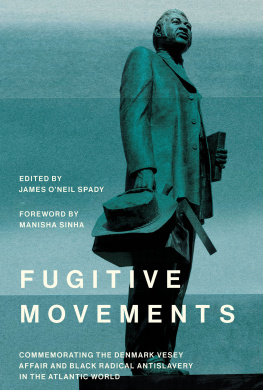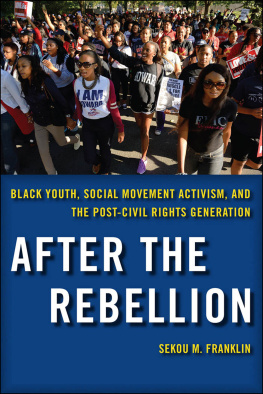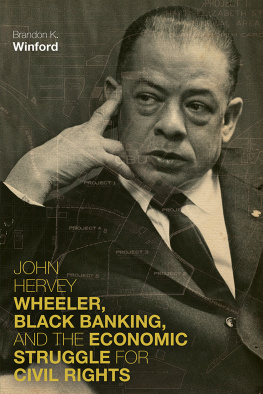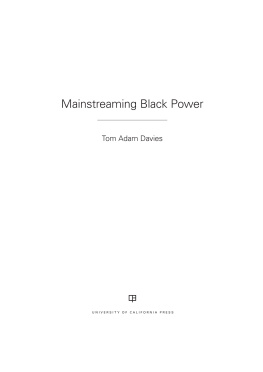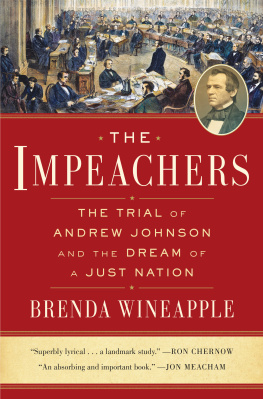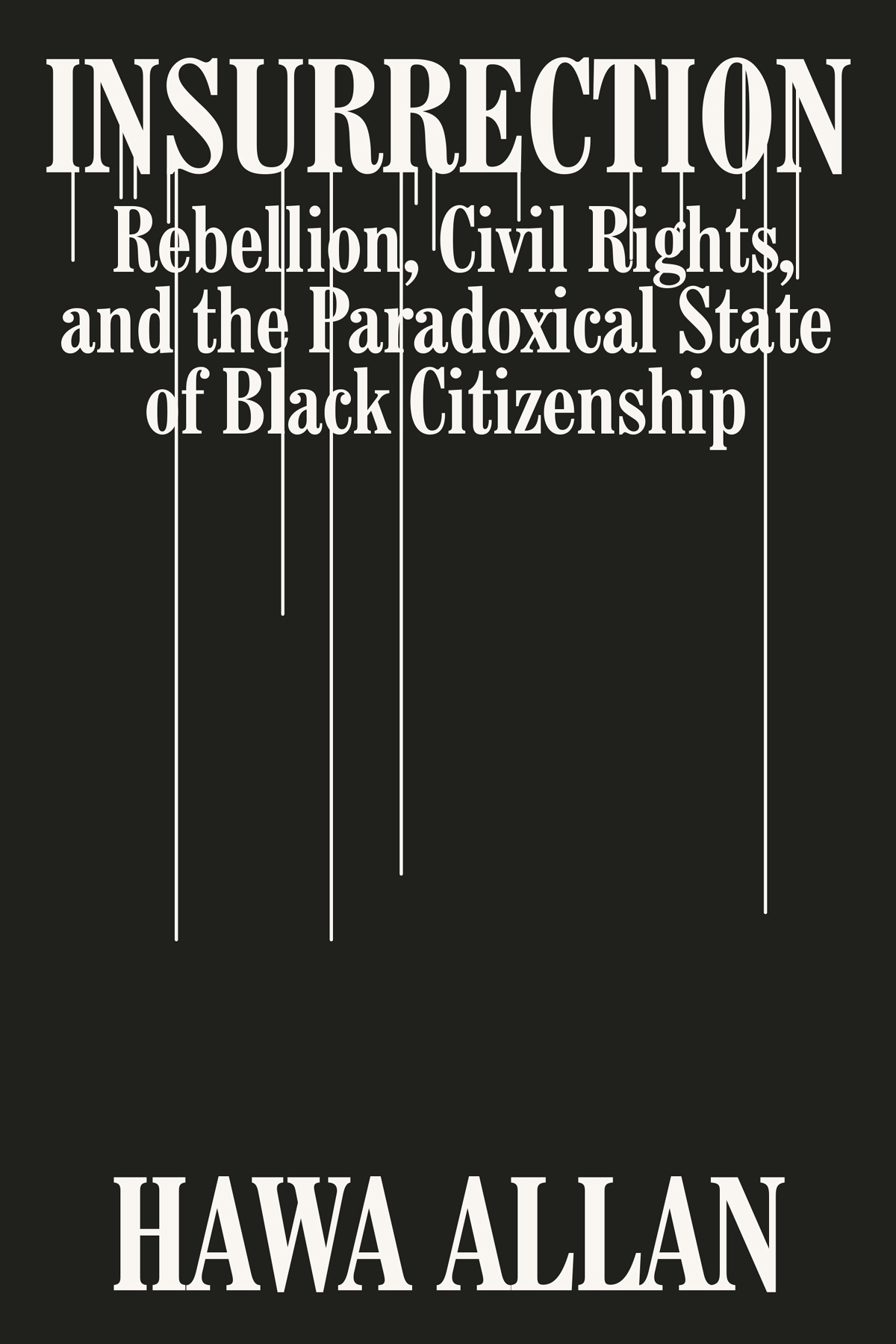Contents
Guide
Page List
INSURRECTION

Rebellion, Civil Rights, and the
Paradoxical State of Black Citizenship
Hawa Allan

CONTENTS
INSURRECTION
O n Monday, June 1, 2020, in front of the historic St. Johns Episcopal Church in Washington, D.C., then-president Donald Trump held up a bible, seemingly upside down, in his right hand and posed rigidly before a barrage of camera flashes. Then, ensconced by Secret Service agents, Trump walked away from the church and back through the adjacent Lafayette Park, where he was flanked by a line of riot police standing at attention behind clear shields. Not long beforehand, some of these very same riot police had likely participated in clearing the park of peaceful protesters with rubber bullets, flash grenades, and tear gas. All of this was occurring in the midst of global protests sparked in response to Derek Chauvins brutal killing of George Floyd in Minneapolis, with massive demonstrations against police brutality coinciding with vandalism, looting, and arsonin other words, with riots.
The weekend immediately prior to the bizarre photo op, a part of St. Johns Episcopal Church itselfknown as the church of the presidentshad been briefly set afire during protests in D.C., prompting Trumps press secretary to select it as a site for the media spectacle. When later questioned about the staged photo, Trump responded that it was very symbolic but never elaborated on what, exactly, is imagery represented. The cryptic symbolism, however, followed a press conference in which Trumpreferring to himself as the president of law and orderthreatened to invoke a beautiful law to restore order to states where governors were unable or unwilling to do so: the Insurrection Act of 1807. The Act allows the president to domestically deploy federal troops and deputize the state National Guard to suppress any insurrection, domestic violence, unlawful combination, or conspiracy.
Trumps threatened invocation of the Insurrection Act during the George Floyd protests incited an uproar among numerous commentators who decried the federal governments use of military power against its own people. The use of federal troops as a civilian police force, according to many commentators at the time, is an unwarranted trespass on the rights and freedoms of American citizens and contravenes the values upon which the United States was founded.
It is true that the military power set forth in the Insurrection Act is an extraordinary exception from the normal state of federal affairs. The power, among other things, upends the conventions of federalism, in line with which domestic deployments of the militiaor the modern-day National Guardare authorized by the state governor. This power also represents a significant departure from the constitutional aversion to standing armies, which some framers feared would result in the arbitrary use of force against civilians and thereby re-create the same sort of authoritarian menace, in the form of the British Army, that American revolutionaries had just sought to free themselves from. The Insurrection Act, then, is both an exception and a ruleit represents a radical deviation from the principles of federalism and aversion to using military forces to police civilians, while authorizing a purportedly necessary use of federal military power to restore law and order amid a domestic crisis.
Unlike contemporary legislation, the 1807 law is fairly spare and markedly devoid of the definitions, articulated exceptions, and other technicalities that characterize more recent statutes. So, an insurrection (or domestic violence or an unlawful combination, etc.) is effectively undefined, left to be envisioned in the eye of the beholderwhether that of the state governor who might request that the president dispatch federal troops pursuant to the Act, or of the president who can unilaterally deploy such troops under this authority. This exceptional power is not without its limitations, because any such insurrection or other civil disturbance, if suppressed unilaterally by the president, must technically either deprive citizens of constitutional rights (which a given state has failed or refused to protect), or violate federal law. Nonethelessand especially in the midst of some emergency or other domestic upheavalan insurrection is, effectively, what the executive says it is.
An insurrection, under the Act, is a definitional vacuum waiting to be filled by the executive. The incidents taken to warrant domestic federal military intervention betray just as much, if not more, about the predilections of those wielding power as they do about the threatening nature of such events. From Nat Turners rebellion to violent clashes over slavery in Bleeding Kansas to white paramilitary resistance during Radical Reconstruction to the desegregation of public schools in Alabama, Arkansas, and Mississippi to the Los Angeles riots in 1992, the events across history that have been interpreted to warrant the domestic deployment of federal troops under the Insurrection Act reveal a pattern: the prevailing invocation of the Act, on the one hand, to suppress revolts against the slave system and so-called race riots, and, on the other, to enforce the civil rights of African Americans. So, although what constitutes an insurrection is technically undefined in the text of the Act itself, the term has been defined in practice through its historical application. What has been interpreted to constitute an insurrection is a mirror reflecting the ongoing and often bloody battle to fully incorporate black Americans into the citizenry of the United Statesa struggle that, in this light, appears more like an open-ended civil war than a history of progress.
An insurrection, however, is also defined by omission. Where the Trump administration, for example, threatened to invoke the Act in response to nationwide demonstrations against police brutality, the same inclination was nonexistent in response to, say, deadly protests in Charlottesville, North Carolina, by white nationalists, or to the storming of the Michigan state capitol by armed mostly white men protesting ongoing COVID-19 pandemic lockdowns. Although the Insurrection Act does not need to be invoked for the president to deploy the D.C. National Guard or federal troops within the District of Columbia, the absence of any military presence during the riotsor, as commentators called it, the insurrectionat the Capitol on January 6, 2021, was certainly glaring. As commander in chief of the D.C. National Guard, it is clear that Trump and his administration could have authorized its deploymentthat is, if they actually intepreted the riot to be a threat to law and order.
Given this context, an insurrection, under the Act, means more than its textbook definitionthat being a violent uprising against an authority or government. Legal pronouncements of insurrection are not merely descriptive. They have material consequences in the physical worldas they warrant the use of violence to enforce a normative state of affairs. To proclaim an insurrection, to borrow from renowned legal scholar Robert Cover, is to deploy the power to create and destroy worlds through the use of force. Legal interpretive acts, writes Cover in his seminal essay Violence and the Word, signal and occasion the imposition of violence upon others. When government officials articulate their understanding of the law, they establish or reestablish the world in which we already live, or, at times, newly construct the world in which we ought to live. Inversely, however, such legal pronouncements also threaten to destroy worlds that deviate from prescribed norms, upholding law and order by subjecting actual and would-be defectors to violence or its threat.


